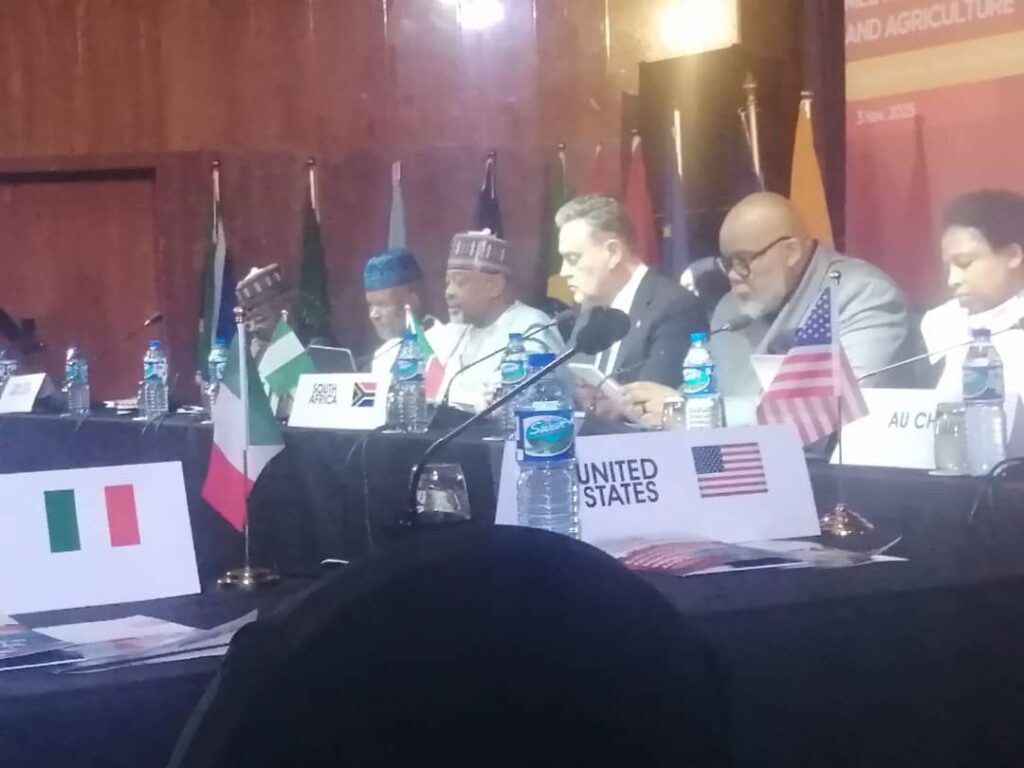By: Goodluck E. Adubazi, Abuja.
The G20 South Africa 2025 Presidency has declared that Africa’s development is a global public good, deserving of collective investment, partnership, and political will to unlock the continent’s full economic potential.
This message resonated strongly at the G20 Africa Outreach Meeting on Industrialization and Agriculture, held on Monday, November 3, 2025, at the Transcorp Hilton, Abuja. The high-level dialogue—hosted under the theme “Solidarity, Equality, and Sustainability”—brought together African ministers, diplomats, and development partners to explore strategies that link agriculture, industry, and trade for inclusive growth.
Speaking at the event, Mr. Ben Joubert, Co-Chair of the G20 Africa 2025 Presidency and Acting Director for Regional Organizations at South Africa’s Department of International Relations and Cooperation, said Africa’s transformation remains a “global imperative” critical to climate resilience, food security, and shared prosperity.
“Despite decades of commitment, Africa’s structural transformation continues to face significant headwinds — underfunding, fragmented markets, and limited access to long-term financing,” Joubert said. “Yet, this moment offers a renewed opportunity. Africa’s development is not only vital for the continent; it contributes directly to global stability and sustainable growth.”
He emphasized that agriculture and industrialization must evolve together to enable stronger food systems, enhanced value addition, and expanded opportunities for trade and job creation.
“Africa’s development is a global public good,” Joubert added. “Through the G20 platform, we can mobilize partnerships, resources, and technology grounded in mutual respect and shared interest to help Africa realize its ambitions.”
The G20 Africa 2025 Presidency will present outcomes from the Abuja dialogue to the broader G20 collective during the upcoming summit in Johannesburg, South Africa, later this month.
Nigeria’s delegation, led by the Minister of Agriculture and Food Security, Senator Abubakar Kyari, CON, and the Minister of State for Industry, Trade and Investment, Senator John Owan Enoh, highlighted ongoing reforms and investments aimed at positioning the country as Africa’s agro-industrial hub.
Senator Kyari shared Nigeria’s experience in linking agricultural productivity to food systems and processing industries, emphasizing the centrality of agriculture to the Renewed Hope Agenda of President Bola Ahmed Tinubu, GCFR.
In his intervention, Senator Enoh described agro-industrial transformation as “an imperative, not an option,” for Africa’s future.
“Agriculture in Africa is more than an economic sector — it is livelihood, dignity, and survival,” Enoh stated. “Industry, on the other hand, represents value, jobs, and sovereignty. The future of our continent lies in the deliberate fusion of agriculture and industry.”
He lamented that despite Africa holding 60 percent of the world’s uncultivated arable land and being home to 1.4 billion people under the AfCFTA, the continent contributes less than 3 percent to global trade and just 1.5 percent to manufacturing output.
“For decades, Africa exported cocoa but imported chocolate; grew cotton but imported garments; mined minerals but imported machinery,” Enoh said. “To reverse this, agro-industrialization must bridge the gap between subsistence and structural transformation.”
The Minister outlined Nigeria’s four-pillar approach under the Renewed Hope Economic Agenda:
Enhancing farm-level productivity through technology and access to inputs.
Expanding Special Agro-Industrial Processing Zones (SAPZs) to convert raw produce into finished goods.
Promoting local content and industrial linkages through the Pro-Nigerian Policy to strengthen domestic manufacturing.
Improving infrastructure, finance, and inclusion to support competitiveness and regional trade.
He cited ongoing SAPZ developments in Oyo and Ogun States, supported by the African Development Bank (AfDB), Islamic Development Bank (IsDB), and IFAD, as examples of Nigeria’s industrial policy in action.
“We are turning cassava into starch and ethanol, rice into branded products, and tomatoes into paste and concentrates,” Enoh explained. “Our backward integration policy is creating local value chains in cotton, cocoa, palm oil, and livestock.”
He further urged the G20 to partner with Africa in three core areas:
Finance: Expanding blended finance and guarantees for cross-border infrastructure.
Technology: Enhancing mechanization, digital agriculture, and local innovation.
Trade Governance: Ensuring WTO reforms protect developing economies while promoting intra-African trade.
“Treaties don’t trade — people and companies do,” Enoh noted. “Borders must become bridges, not barriers. A tomato processed in Kano should reach Accra without harassment or multiple duties.”
Participants, including Ambassador Bukar Hamman, Nigeria’s G20 Sherpa; H.E. Salaheddine Abbas Ibrahima, High Commissioner of Cameroon and Dean of the Africa Group in Abuja; and Ambassador Jose Bamoquina Zau of Angola, commended Nigeria and South Africa for advancing the G20 Africa agenda through constructive dialogue.
The meeting’s outcomes will shape Africa’s unified position at the G20 Johannesburg Summit, where leaders are expected to push for stronger global partnerships that align with Africa’s industrial and agricultural priorities.
“We must approach this dialogue with openness, humanity, humility, and partnership,” Joubert concluded. “Together, we can help shape a future where African agriculture and industry thrive — not in isolation, but as integral parts of a resilient and inclusive global economy.”

